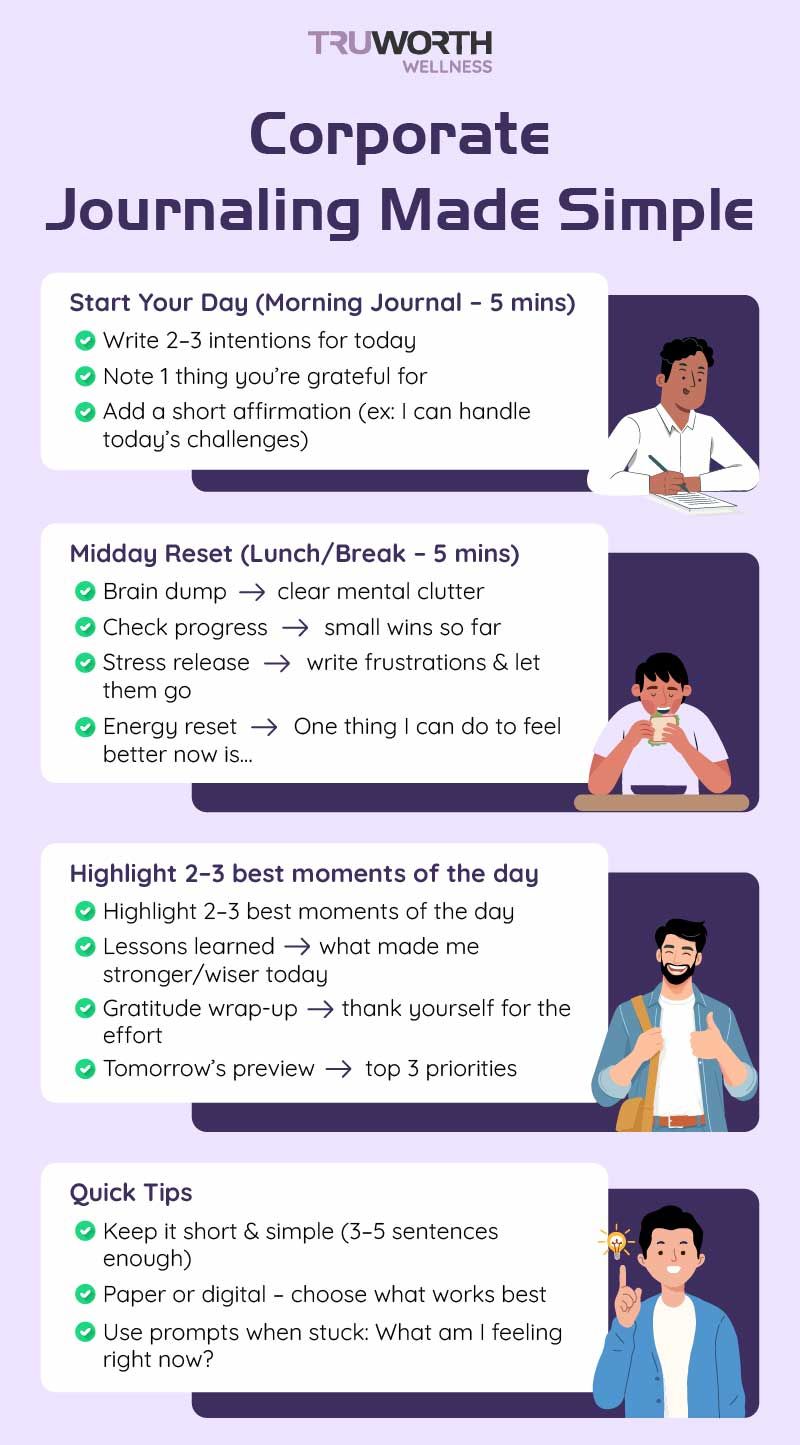Journaling Routine At Work: How To Start, End, & Fill The Gaps In Between?

Most professionals struggle with mental clutter, stress, and lack of focus. Emails pile up, deadlines race closer, and meetings leave little time for self-reflection. Amidst all this, one simple yet powerful tool can act as your personal anchor—journaling.
Journaling is no longer limited to personal diaries or creative writers. Today, it has become a strategic practice for professionals to enhance clarity, emotional fitness, and productivity at work. But the most common question is: how do I actually start, what do I write in the middle of my day, and how do I close my day with journaling?
Here’s a step-by-step guide.

1. Starting Your Day with Journaling
Your morning journal sets the tone for the entire day. Instead of diving straight into emails or social media, spend 5–10 minutes writing down thoughts and intentions.
How to begin?
- Set intentions: Write down 2–3 things you want to achieve today, not just tasks, but feelings. (Example: “I want to stay calm in meetings,” or “I will finish the client proposal draft.”)
- Gratitude check-in: List at least one thing you are thankful for before you start work. Gratitude reduces stress hormones and improves focus.
Affirmations: Write short positive reminders, such as “I am capable of handling today’s challenges”.
👉 Morning journaling acts like a compass—it points you towards what truly matters instead of letting the day control you.
2. Midday Journaling: The “In Between” Reset
By afternoon, most professionals hit an energy slump or feel overwhelmed. This is where a midday journaling break can work wonders. Think of it as a reset button.
What to do in between?
- Brain dump: Write down everything that’s clouding your mind—unfinished tasks, worries, random thoughts. Emptying your head gives you clarity.
- Progress check: Reflect on what you’ve accomplished so far. Even small wins count and boost motivation.
- Stress release: If something frustrated you, write it out instead of carrying it to the next meeting. (Example: “That email upset me, but I choose to respond calmly.”)
- Energy reset: End with a quick note: “One thing I can do to feel better right now is…” (Stretch, hydrate, take a walk, or simply breathe.)
👉 Midday journaling prevents burnout and helps you realign before the second half of your workday.
3. Ending the Day with Journaling
Evening journaling is about reflection and closure. It allows you to leave work stress on the page instead of carrying it home.
How to close your day?
- Daily highlights: Note the 2–3 best things that happened today. It could be finishing a tough project or having a good conversation with a colleague.
- Lessons learned: Write one takeaway from the day—something that made you better, stronger, or wiser.
- Gratitude wrap-up: Thank yourself for the effort you put in. Corporate professionals often forget self-appreciation.
- Tomorrow’s preview: Jot down your top priorities for the next day. This clears your mind and improves sleep.
👉 Night journaling creates a sense of closure, so you don’t carry workplace worries into your personal time.
4. Practical Tips to Build the Habit
1) Keep it simple: You don’t need fancy notebooks or long entries. Even 3–5 sentences can work.
2) Stay consistent: Journaling works best when done regularly, even if only for a few minutes.
3) Digital or paper? Both work—choose what’s convenient. Some prefer the tactile feel of writing by hand; others use apps for speed.
4) Use prompts: If you’re stuck, use questions like:
- What am I feeling right now?
- What’s one win from today?
- What’s draining my energy?
- What can I do differently tomorrow?
Why Corporations Should Care About Journaling?
For organizations, encouraging employees to journal isn’t just a wellness perk—it’s a productivity booster. Journaling helps employees:
- Reduce stress and anxiety
- Build resilience and emotional fitness
- Sharpen decision-making
- Improve communication skills
- Create a culture of reflection and growth
When employees feel mentally organized and emotionally lighter, they bring their best selves to work.
Final Thought
Journaling is not about perfect writing—it’s about clearing mental space. Starting your day with intention, pausing mid-day to reset, and closing your day with reflection can transform your corporate life. It’s like having a private coach and therapist within the pages of your notebook.
So tomorrow morning, instead of checking your inbox first thing, try journaling for five minutes. By the end of the week, you’ll notice the difference—not just in your productivity, but in your peace of mind.
Corporate wellness programs like Truworth Wellness can guide teams in adopting habits like journaling, mindfulness, and resilience-building.